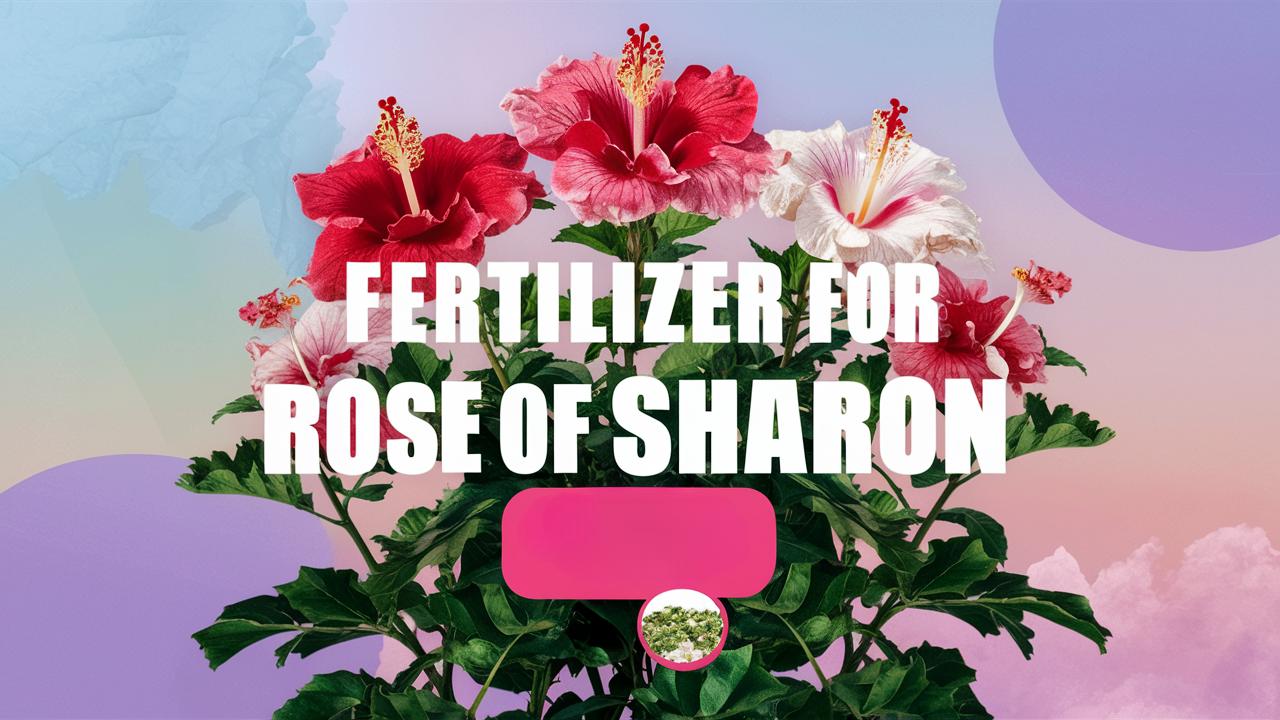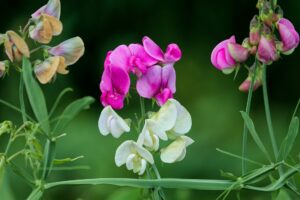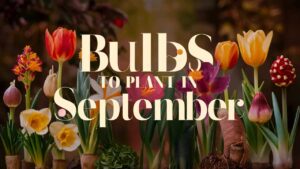If you’re uncertain about how to nourish your Rose of Sharon, fear not! In this guide, we’ll walk you through the considerations and options for choosing the best fertilizer for your beloved shrub.
Fertilizer For Rose Of Sharon
| Image | Name | Rating | Shop |
|---|---|---|---|
 | EarthPod Tropical Flower Fertilizer |  | |
 | NutriStar Hibiscus Food |  | |
 | HibiscoCare |  |
EarthPod Tropical Flower Fertilizer
For Rose of Sharon plants, we recommend using a fertilizer specifically designed for tropical flowers, as they have similar growing needs. The 100 EarthPods from this product listing seem like a great option due to its unique properties and benefits.
This product is a compact, eco-friendly solution that provides a concentrated dose of organic plant nutrients, trace minerals, soil life, and humates directly to the root zone of your Rose of Sharon. Simply push one EarthPod into the potting soil near the center of the plant and water it in – no messy liquids or confusing measuring spoons required. With its 100-count supply, you’ll have enough for a single special tropical Hibiscus or multiple potted tropical flowers over time.
NutriStar Hibiscus Food
This may be your best option when looking to fertilize a Rose of Sharon plant.
The NutriStar Hibiscus Fertilizer from Nelson Plant Food seems like a reliable choice. It’s designed to promote healthy growth, blooms, and overall health. With its 10-4-12 slow-release formula, feeding once a month is all that’s required. This product features high levels of potassium, which aids in flowering production, as well as necessary nutrients calcium, iron, and magnesium. The ease of use, being in granular form rather than liquid, makes it ideal for both indoor and outdoor plants.
HibiscoCare
BGI’s HibisGAIN fertilizer is a product specifically designed to meet the diverse needs of hibiscus plants like the Rose Of Sharon. Given its formulation tailored to suit the unique growth habits of these plants, this product can be considered as a reliable option.
Commercial growers in Homestead, Florida have used HibisGAIN successfully and one notable advantage is that it’s easy to apply directly on top of soil without requiring any mixing. The 2lb pack also features a resealable design which makes storing the left-over product convenient. Overall, users looking for an uncomplicated fertilizer option tailored to their plant type may find HibisGAIN suitable for their hibiscus plants.
Fertilizer
Rose of Sharon hedges require a balanced fertilizer for optimal growth and blooming. The Hibiscus & Tropical Plant Food 4lb. bag is recommended. This fast-acting formula feeds the plant’s roots quickly, providing essential nutrients it needs to thrive.
This fertilizer enhances size, color, and quality in Rose of Sharon hedges, making it an ideal choice for gardening enthusiasts. With its balanced N-P-K ratio (12 available forms) and micronutrients like sulfur and magnesium, this product provides comprehensive nutrition for your plant’s overall health and appearance.
Tropical Plant Fertilizer
This Fertilome (11045) Hibiscus and Tropical Plant Food is a good choice for Rose of Sharon fertilizer needs. It’s specifically designed to enhance size, color, and quantity of blooms, making it perfect for flowering plants like Hibiscus.
The 17-7-10 formula contains Nitrogen, Phosphate, Potassium, and other nutrients that promote healthy growth. For best results, apply the fertilizer every other week until blooms appear, then once a month during bloom time. Be sure to follow application instructions on the label, as it may vary depending on the size of your Rose of Sharon plant.
Hawaiian Bud and Bloom Fertilizer
For rose of sharon plants looking to see some real growth and development, consider using the Grow More Urea-Free Hawaiian Bud and Bloom 5-50-17 Fertilizer. This water-soluble fertilizer is specifically designed to trigger rapid root and bud development, resulting in stunning and vibrant blooms.
This formula’s high phosphorus content also helps to improve produce storability, ensuring that the blooms stay fresh for a longer period of time. Additionally, its nutrient-rich composition strengthens plants and boosts their immunity with its high potassium content, promoting drought resistance even in challenging conditions. With easy-to-follow application instructions and precise coverage thanks to UV-stable color tracers, this fertilizer is perfect for those new to plant care.
Garden Myco
For those looking for an organic fertilizer option for their Rose of Sharon plants, we recommend checking out EB Stone Hibiscus and Palm Food. This 4 lb fertilizer is a great choice due to its easy-to-use format.
This product’s listing highlights its key features: it’s completely natural, containing mycorrhizae, a helpful attribute in soil development that benefits both plants and beneficial organisms in the garden. Additionally, its organic composition means it won’t cause harm to your Rose of Sharon or surrounding ecosystem when used responsibly according to instructions. As a result, you can trust this fertilizer to effectively sustain and promote healthy growth for your plant.
How to Choose Fertilizer for Rose of Sharon: A Comprehensive Guide
The Rose of Sharon, known scientifically as Hibiscus syriacus, is a stunning, hardy shrub that brings charm and vibrant color to gardens across the world. With its colorful blooms, the Rose of Sharon is an excellent addition to landscapes, providing visual interest from summer to fall. However, to keep this gorgeous plant healthy and blooming profusely, selecting the right fertilizer is essential.
Understanding the Nutritional Needs of Rose of Sharon
Nutritional Basics
Before diving into fertilizer specifics, it’s crucial to understand what nutrients the Rose of Sharon needs to thrive. Like many flowering plants, it requires three primary macronutrients: nitrogen (N), phosphorus (P), and potassium (K).
Nitrogen (N) promotes leaf growth and overall plant health, leading to vigorous foliage.
Phosphorus (P) supports robust root development and encourages flowering.
Potassium (K) aids in overall plant resilience and enhances blooming.
In addition to these macronutrients, trace elements like magnesium, calcium, and iron also play vital roles. Ensuring an appropriate balance of these nutrients creates the perfect foundation for your Rose of Sharon.
Evaluating Soil Quality
To determine the nutritional needs of your Rose of Sharon, start by assessing your soil quality. Healthy soil is the cornerstone of plant health. Conduct a soil test to analyze pH levels and nutrient concentration. Rose of Sharon prefers slightly acidic to neutral pH levels (around 6.0 to 7.0). The results will help you understand what specific nutrients your soil may lack and which fertilizer would be the most beneficial.
Types of Fertilizers for Rose of Sharon
Choosing the right type of fertilizer is critical. Various options are available, and understanding the differences will allow you to make an informed decision suited to your shrub’s needs.
Organic Fertilizers
Organic fertilizers are derived from natural sources and often include materials such as compost, manure, or slow-release granules. Using organic options can promote a thriving ecosystem in your soil, enhancing microbial activity beneficial for plant health.
Compost: Well-rotted compost provides a slow-release source of nutrients while improving soil structure and moisture retention.
Bone Meal: This is high in phosphorus, promoting strong root development and a healthy bloom. It’s excellent for blooming shrubs like Rose of Sharon.
Fish Emulsion: A liquid fertilizer high in nitrogen and trace minerals can encourage lush foliage growth and is suitable for regular applications during the growing season.
Organic fertilizers tend to act more slowly than synthetic options, so they are ideal for those who prefer a sustainable approach.
Synthetic Fertilizers
Synthetic fertilizers provide a concentrated, quickly available source of nutrients. They often come in granular or liquid form.
Balanced Fertilizers (10-10-10): A balanced approach with equal parts nitrogen, phosphorus, and potassium supports overall growth, making it an excellent choice for established shrubs.
Bloom Boosters (5-10-5): These are high in phosphorus, promoting flowering. Ideal for pre-bloom applications, they encourage abundant bud formation to enhance your Rose of Sharon’s floral display.
Synthetic fertilizers can lead to rapid plant growth; however, caution must be exercised to avoid over-fertilizing, which can damage the plant.
Slow-Release Fertilizers
Slow-release fertilizers offer a compromise between organic and synthetic types. They gradually release nutrients into the soil, feeding your Rose of Sharon over an extended period.
Granular Slow-Release Fertilizers: These typically have controlled nutrient release mechanisms and are ideal for creating a stable feeding environment. Look for blends that appropriately match the needs of flowering shrubs, often labeled specifically for use on perennials.
Water-Soluble Fertilizers: Mixtures designed to be diluted in water can also provide a gradual feeding over several weeks. This is particularly useful if you’re aiming for quick bursts of growth or flower promotion in a staggered schedule.
Timing Your Fertilization
Fertilization timing is as critical as the type of fertilizer you choose. The growth cycle of Rose of Sharon follows seasonal patterns, and understanding these will help you maximize their health and blooming potential.
Spring Awakening
As the growing season begins in early spring, it’s an ideal time to nurse your Rose of Sharon back to health after dormancy. A balanced or bloom-boosting fertilizer can be applied at this stage to support new growth and prepare the plant for its flowering phase. Fertilizing too early when the plant still shows signs of dormancy can lead to root burn or nutrient waste.
Pre-Bloom Application
About 4 to 6 weeks before you expect blooms, apply a phosphorus-rich fertilizer. This will energize flower development and prepare your shrub for an explosion of color. Many gardeners recommend a second application after the first flush of blooms, particularly if you notice the flowers fading prematurely.
Late Summer Feeding
After the initial blooming period, consider a late-summer feeding to prolong flowering and strengthen the plant for fall and winter dormancy. While it’s best to avoid stimulating new growth too late in the season, providing a steady supply of nutrients can ensure your plant remains healthy and vibrant.
Signs Your Rose of Sharon Needs Fertilizer
Being observant is key to caring for your Rose of Sharon. Knowing when your plant needs fertilization allows you to respond promptly and effectively.
Yellowing Leaves
When the leaves of your Rose of Sharon begin to yellow, particularly if they’re older leaves, this may indicate a nutrient deficiency—often linked to nitrogen. Addressing this promptly with a nitrogen-rich fertilizer can restore foliage health.
Poor Growth and Sparse Blooms
If the plant seems stunted, producing fewer blooms or smaller flowers than usual, it might signal a lack of phosphorus or potassium. A balanced or bloom-enhancing fertilizer can help revive your shrub and encourage robust growth.
Wilting or Stress Signs
Over-fertilization can lead to signs of stress, including wilting or browning leaf edges. If you suspect this is happening, flush the soil with water to leach out excess salts and allow your plant to recover.
Application Tips for Optimal Results
Once you’ve decided on the fertilizer type and timing, effective application is critical for achieving results. Here are some tips for optimal fertilizer use.
Following Instructions
Always adhere to the manufacturer’s instructions regarding dosage and method of application. Incorrect dosages can negate the intended benefits and harm your plant.
Choosing Dry vs. Wet Application
A granular dry fertilizer can be sprinkled around the base of the plant, followed by watering to ensure nutrients reach the soil. Alternatively, a water-soluble fertilizer can be mixed and applied directly during regular watering. This method allows for more precise nutrient delivery.
Avoiding Fertilizer Burn
To prevent fertilizer burn, particularly with synthetic options, avoid placing fertilizer directly against the plant’s stem or roots. Instead, spread it evenly around the drip line—the area directly beneath the outermost branches—where feeder roots are concentrated.
Watering Considerations
After fertilizing, it’s beneficial to water your Rose of Sharon deeply. This will help the fertilizer penetrate into the root zone and reduce the risk of root burn.
Environmental Considerations
As responsible gardeners, understanding our environmental impact is paramount. Choosing fertilizers that align with sustainable practices can contribute positively to ecosystem health.
Organic vs. Synthetic Debate
While synthetic fertilizers can yield immediate results, they often come with environmental concerns, such as potential runoff into water systems, which can lead to algal blooms. Opting for organic fertilizers minimizes these impacts and supports a thriving soil environment.
Go Slow to Grow
If you’re unsure about which fertilizer to choose or how much to apply, err on the side of caution. Applying smaller amounts of organic or slow-release fertilizers can provide long-term plant health without the risk of fertilizer shock.









